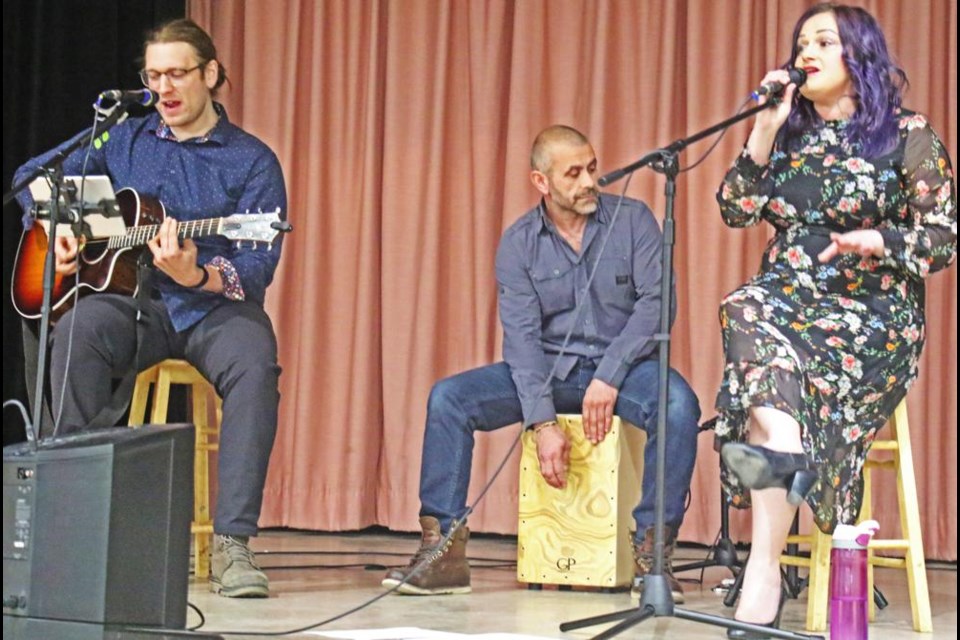WEYBURN – Country music singer Amy Nelson shared her struggles with mental health as she spoke to the audience at the Mayor’s Luncheon on Tuesday at McKenna Hall, held as part of Mental Health Week for CMHA Weyburn.
Prior to her taking the stage, Mayor Marcel Roy brought greetings, along with Terry Romanow, the southeast manager of mental health and addictions for the Sask. Health Authority; Phyllis O’Connor, executive director for CMHA’s Saskatchewan Division; and Mal Barber, chair of the board for CMHA Weyburn.
In sharing her story, Nelson noted a career in the music industry isn’t easy for anyone, but for her the main struggle she has had is depression.
Her background was as a high school music teacher, but her career as a musician took her away from the school too much, so on her own she established a music school which is now entering its 13th year.
“The impression I’ve always given people is I’m bubbly, positive and having a great time. Nobody other than friends and family knew how much I struggled. My main struggle is with depression,” she said, adding she also has some anxiety “and a healthy amount of ADHD.”
Describing how debilitating the depression is at times, she said, “It’s a dark cloud over your head. Nothing is ever okay. It feels like nothing can be good, it’s so dark.”
Nelson said if she goes into a friend’s house with all the lights off, she can’t stand the darkness so she goes around and turns all the lights on, and when she goes to a restaurant, she has to sit by a window where the best light is.
Over the years she has tried a number of medications and has seen three psychiatrists prior to the current one who is treating her.
Her psychiatrist suggested some medications, and when they didn’t work for her, he then suggested ECT, electro-convulsive therapy, used with people who suffer depression disorder or bipolar disorder, for whom medication has not worked at all.
According to her doctor, 80 per cent of ECT patients have experienced substantial improvements. Nelson decided she wanted to try it, but admitted to having some fear to having electrodes hooked up to give her an electric shock as part of the treatment.
She went in for treatments twice a week, and to date has had 18 ECT treatments. She went in to the hospital early, around 6 a.m., had electrodes hooked up and she was sedated. The mild shock was given for around 60 seconds by a trained psychiatrist, and she usually woke up five to 10 minutes later.
Nelson said after about 11 of these treatments, she began to feel a difference. “I could tell something was working, and it slowly started to become less dark … It’s the best feeling ever.”
She added that she realizes not everyone would benefit from ECT, and it’s not the first thing anyone would try, but for herself, after trying many kinds of medications and anti-depressants, she has found that it has been working.
One side effect she has had is a temporary short-term memory loss, she said. “It’s not always going to be that way. The loss of certain memories does suck, but I get to have a much, much better quality of life.”
She had never talked publicly before about her struggles, but in February during the Bell Let’s Talk mental health campaign, she posted comments on social media about what she had been going through, and received a huge response.
She subsequently did an interview with CBC Radio, and with a journalist from the U.K. Mal Barber, the chair of the board for CMHA Weyburn, heard her CBC interview and contacted her about coming to Weyburn to speak as part of Mental Health Week.
“I didn’t know I could talk about this, but a lot of good things have happened,” she said, adding the hope she can inspire other people not to give up and to find answers to their mental health questions and problems.
“It’s really easy to give up, especially when it feels that dark, but hopefully I’ll be an inspiration to others,” said Nelson, noting that no one at the luncheon knows what the others at their tables might be going through.
As for her treatments, she said it’s possible she may never need another one. “I think it’ll be a lifelong journey, and will be something I can talk to other people about,” she said.




